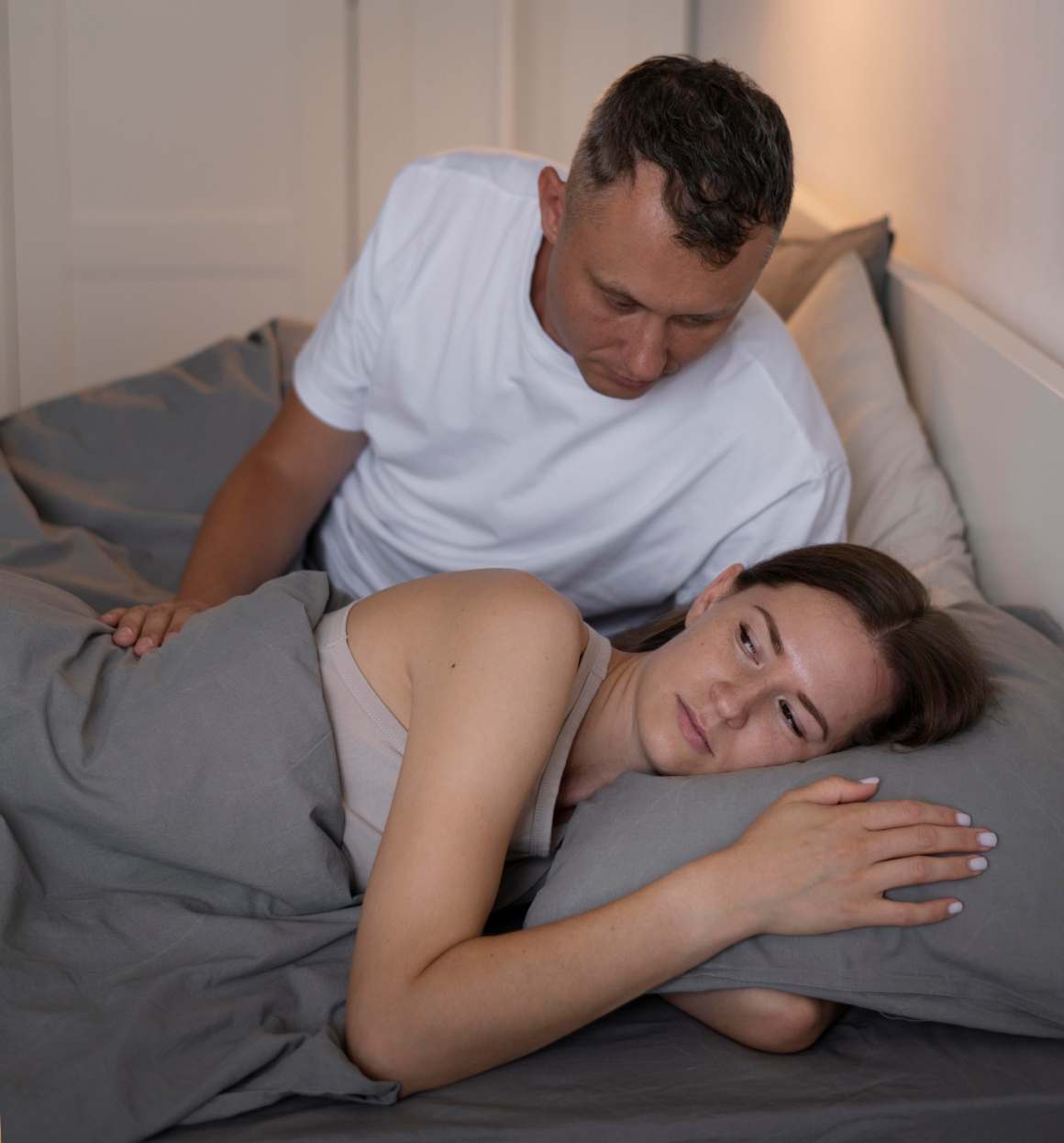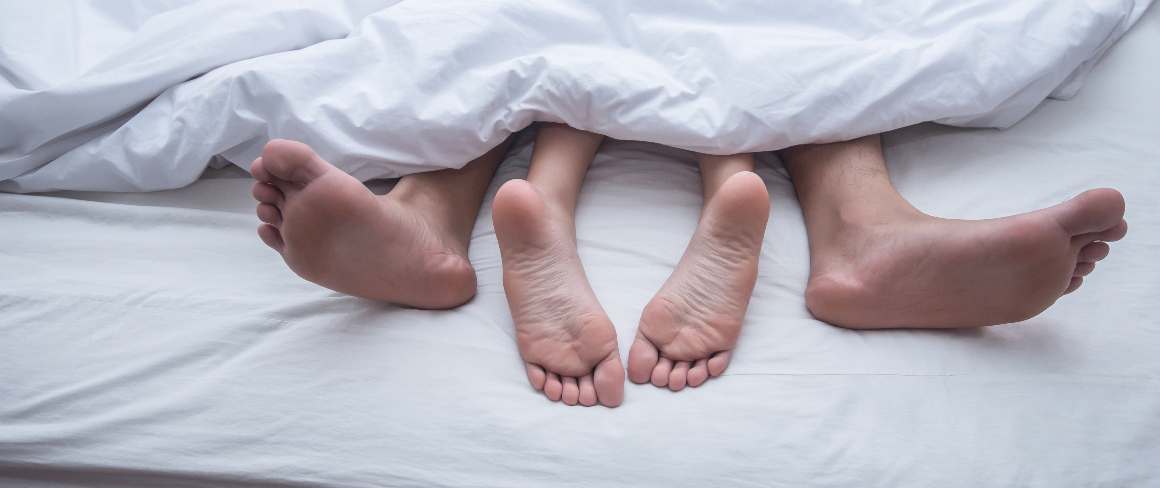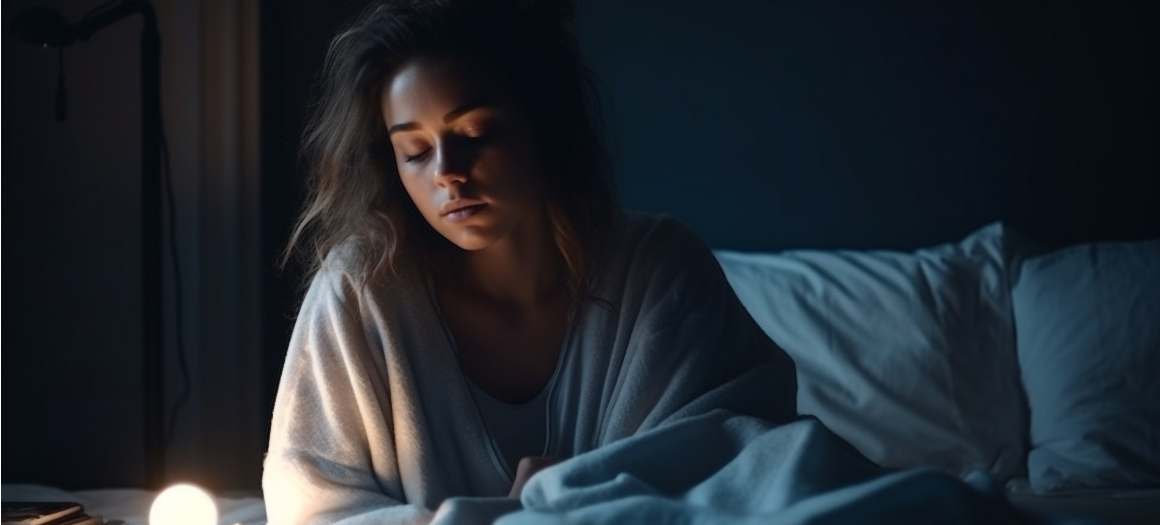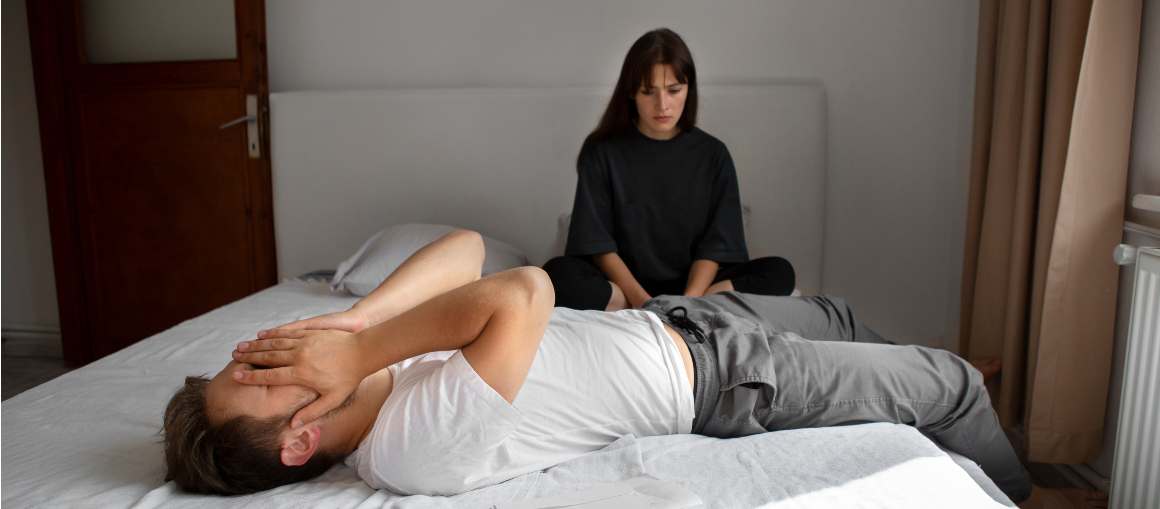Sexsomnia: Causes and Treatment
Published:
Imagine waking up in the middle of the night to find yourself engaging in sexual activity with your partner, but without any recollection of initiating it. This puzzling and potentially distressing scenario is not a figment of one's imagination; rather, it is an actual sleep disorder called sexsomnia.
Contents:
- Understanding Sexsomnia: A Rare and Complex Sleep Disorder
- Causes of Sexsomnia: Unraveling the Mystery
- Diagnosing Sexsomnia: A Comprehensive Guide
- Legal Implications Surrounding Sexsomnia Cases
- Treatment Options for Sexsomnia
- Preventing Sexsomnia Episodes
- Preventing Sexsomnia Episodes: Tips and Techniques
- FAQs in Relation to Sexsomnia
- Conclusion
Sexsomnia, also known as sleep sex or sexual parasomnia, is a condition characterized by involuntary sexual behaviors during non-REM (NREM) sleep. In this comprehensive blog post, we will delve into various aspects of this intriguing yet challenging phenomenon.
We will explore the characteristics and prevalence of sexsomnia among men and women, discuss diagnostic methods such as sleep studies and identifying NREM parasomnias, and examine the legal implications surrounding alleged cases involving malingering forms. Furthermore, we'll investigate potential causes and triggers like stress-induced episodes or alcohol consumption.
Finally, our discussion would be incomplete without addressing prevention strategies including maintaining good sleep hygiene practices as well as treatment options such as medication management approaches and counseling for affected individuals along with their partners. So join us on this journey to better understand sexsomnia – its complexities may surprise you!

Understanding Sexsomnia: A Rare and Complex Sleep Disorder
Let's dive into the world of sexsomnia, a mysterious sleep disorder that can have significant consequences for those affected.
First off, what exactly is sexsomnia?
This rare condition is characterized by sexual behaviors exhibited during sleep and primarily affects men. In some cases, sexsomniacs may engage in sexual vocalizations or even initiate nonconsensual sexual activity with their bed partners while asleep. This understandably leads to distress for both parties involved and can strain relationships significantly.
Definition of Sexsomnia
Sexsomnia falls under the umbrella of NREM parasomnias - a group of sleep disorders involving abnormal behavior during non-rapid eye movement (NREM) sleep stages. The phrase "sexual parasomnia" has also been employed to describe this phenomenon more generally.
Impact on Individuals and Relationships
Affected individuals often feel shame or guilt upon learning about their actions from concerned partners or through self-discovery via video recordings made in an attempt to diagnose other potential sleep disorders. Beyond emotional turmoil, there are legal implications surrounding alleged incidents related to sexsomina. Forensic psychiatrists play an essential role in assessing whether the accused was indeed suffering from new-onset sleep-related sexual behavior at the time of the incident.
With this newfound understanding, let's explore the potential causes and treatment options for sexsomnia in upcoming sections.
Causes of Sexsomnia: Unraveling the Mystery
Although the exact cause remains unclear, there are several factors believed to trigger this rare sleep disorder. We'll explore these potential triggers in detail below:
Stress-Related Causes
Stress can have detrimental effects on our physical and mental wellbeing, including affecting our sleep cycles. Studies suggest that high stress levels may contribute to parasomnias like sexsomnia by causing partial arousals during non-REM sleep stages.
Alcohol Consumption Link to Sexsomnia
Cheers or jeers? Alcohol consumption might be a double-edged sword when it comes to sexsomina episodes. Research indicates that excessive alcohol intake before bedtime can increase the likelihood of experiencing abnormal sexual behaviors during sleep.
Medications That May Trigger Episodes
Popping pills could potentially pop up some unwanted nighttime surprises. Certain medications, such as sedatives, hypnotics, and even some antidepressants have been linked with an increased risk of developing parasomnias like sexsomnia.
Medical Conditions Associated with Sexsomnia
Some medical conditions may be playing hide-and-seek in the shadows of sexsomina episodes. Studies suggest that individuals suffering from obstructive sleep apnea, restless leg syndrome, or other sleep disorders might be more prone to experiencing sexual behaviors during non-REM sleep.
In summary, understanding these potential triggers can help us unravel the mystery behind this complex and rare condition called sexsomnia. Stay tuned for our next section on diagnosing this elusive disorder.

Diagnosing Sexsomnia: A Comprehensive Guide
It's important to understand that diagnosing this rare sleep disorder can be quite challenging, as many individuals are completely unaware they exhibit these behaviors while asleep.
Parasomnias, like sexsomnia, often occur during partial arousal states and may not be easily detected without proper assessment.
Challenges in Diagnosing the Condition
The main challenge lies in gathering accurate information about the patient's sleep-related sexual behaviors. Oftentimes, it is only through reports from bed partners or other witnesses that these episodes come to light. This makes obtaining a reliable history crucial for an accurate diagnosis and treatment plan.
Video-Polysomnography Explained
To better assess suspected cases of sexsomnia, doctors may recommend a recorded sleep study known as video-polysomnography (VPSG). VPSG involves monitoring various physiological parameters such as brain activity, eye movements, muscle tone, heart rate, and respiratory patterns during sleep under controlled clinical settings.
Legal Implications Surrounding Sexsomnia Cases
Let's address the issue at hand. Sexsomnia, also known as sleep-related abnormal sexual behaviors or sexual parasomnia, can lead to serious legal consequences, especially when it involves nonconsensual sexual acts.
This is where forensic psychiatrists step in to assess the accused's condition during alleged incidents. Evaluating whether an individual was indeed suffering from sexsomnia at the time of an incident is crucial for a fair trial. A forensic psychiatrist will consider factors such as sleep history, prior episodes, and any underlying medical conditions that may contribute to sexsomnia symptoms.
Role Of Forensic Psychiatrists In Assessing Accused's Condition
Forensic psychiatrists play a vital role in sexsomnia cases. They help assess the accused's condition during alleged incidents and determine whether the individual was indeed suffering from sexsomnia at the time. This evaluation is crucial for a fair trial.
Criminal Consequences And Clinical Experience
Sexsomnia can have severe criminal consequences, especially when it involves nonconsensual sexual acts. Understanding the clinical aspects of this disorder is vital for both prosecution and defense teams. Research on criminal consequences related to this disorder helps raise awareness and provides valuable insights into how these cases should be handled legally.
Tips For Preventing Legal Issues Related To Sexsomnia:
- If you believe that you have sexsomnia or if your partner has informed you of abnormal sexual behaviors during sleep, get professional help right away. A proper diagnosis can aid in managing your condition effectively and prevent potential legal issues down the line.
- Maintain open communication with your partner about your condition and any episodes you experience. Keep dialogue open with your partner about the condition and any episodes that may occur, so they can comprehend it better and misapprehensions are avoided.
- Consider sleeping in separate beds or rooms if necessary to minimize the risk of unwanted sexual behaviors during sleep.
In conclusion, understanding sexsomnia's legal implications is essential for both individuals suffering from this disorder and their partners. Seeking professional help early on can not only improve one's quality of life but also prevent potential criminal consequences related to this specialized non-REM parasomnia. Sleep well, stay safe.
Sources: NCBI, PubMed

Treatment Options for Sexsomnia
After being diagnosed with sexsomnia, you may be curious about your treatment options.
Don't worry. We've got your back.
In this section, we'll explore various treatment options that can help alleviate the symptoms of this complex sleep disorder.
Addressing Contributing Factors
The first step in treating sexsomnia is identifying and addressing any underlying causes or triggers. This may include managing stress levels, treating medical conditions like sleep apnea, or adjusting medications that could be contributing to episodes.
Pharmacological Interventions for Severe Cases
If addressing these factors doesn't provide relief, it's time to consider more advanced treatment options for severe cases of sexsomnia.
Benzodiazepines: These medications are often prescribed for their sedative effects and have shown promise in reducing sleep-related sexual behaviors. However, they should be used cautiously due to potential side effects and dependency risks.
Selective Serotonin Reuptake Inhibitors (SSRIs): Often used as antidepressants, SSRIs have also demonstrated effectiveness in some cases of sexsomnia by altering brain chemistry associated with arousal during sleep. Consult your physician to see if SSRIs could be a feasible solution for you.
Preventing Sexsomnia Episodes
No surefire method to dodge sexsomnia exists, yet you can take steps to reduce the chances of an episode.
Stress Management Techniques
Practicing relaxation techniques like progressive muscle relaxation, deep breathing exercises, or mindfulness meditation can help manage stress and promote better sleep quality.
Importance of a Regular Sleep Schedule
Maintaining a consistent sleep schedule is crucial for overall sleep health. Aim for 7-9 hours of restful slumber each night and try to go to bed and wake up at the same time every day.
Seeking Professional Help When Needed
If your symptoms persist despite trying these strategies, don't hesitate to consult with a sleep specialist. They'll be able to provide personalized guidance on managing your condition effectively.
Preventing Sexsomnia Episodes: Tips and Techniques
Let's face it, sexsomnia can be a tricky condition to tackle. While there's no magic bullet for completely avoiding episodes, certain lifestyle changes and precautions may help minimize the risk of occurrence. So let's dive into some actionable tips.
Stress Management Techniques
First up: stress management.
Research shows that managing your stress levels can have a positive impact on sleep quality - which might just keep those pesky sexsomnia episodes at bay.
- Meditation is an excellent way to calm your mind before bedtime. Try guided meditation apps like Headspace.
- A regular exercise routine can also work wonders in reducing stress levels. Just avoid vigorous workouts close to bedtime.
- Create a relaxing pre-sleep environment by taking a warm bath or reading a book instead of watching TV or scrolling through social media.

Importance of a Regular Sleep Schedule
Maintaining consistency is key when it comes to sleep schedules.
- Establishing regular bedtimes and wake-up times helps regulate your body's internal clock, making it easier for you to fall asleep and stay asleep throughout the night (without any unwanted interruptions).
- Aim for roughly 7-9 hrs of shut-eye nightly, as advised by the National Sleep Foundation.
- And don't forget to create a comfortable sleep environment - invest in a quality mattress and pillows, keep your bedroom cool and dark, and minimize noise.
Seeking Professional Help When Needed
Last but not least: know when it's time to call in the experts.
If you've tried everything else and sexsomnia episodes persist or worsen, consult with a sleep specialist for further evaluation and guidance on treatment options.
Your mental health is just as important - consider seeking therapy or counseling if you're struggling with feelings of guilt or shame related to sexsomnia incidents.
Remember: while there's no guaranteed way to prevent sexsomnia entirely, these tips can help reduce its frequency and impact on your life. Stay proactive about managing stress levels, maintaining healthy sleep habits, and seeking professional support when needed.
FAQs in Relation to Sexsomnia
Is Sexsomnia a Sleep Disorder?
Sexsomnia, also known as sleep sex or sexual parasomnia, is a rare sleep disorder that falls under the category of Non-Rapid Eye Movement (NREM) parasomnias. It involves involuntary sexual behaviors during sleep and can be triggered by various factors such as stress, alcohol consumption, or certain medical conditions.
What are the Behaviors of Sexsomnia?
Behaviors associated with sexsomnia include fondling, masturbation, moaning or making sexual noises, initiating sexual activity with another person without consent or awareness, and even attempting intercourse. These actions occur involuntarily while the individual is asleep and they typically have no memory of them upon waking.
How is Sexsomnia Diagnosed and Treated?
Diagnosing sexsomnia can be challenging, as it requires a thorough evaluation of the patient's medical history, sleep patterns, and behaviors. A sleep study may also be conducted to monitor the patient's brain activity, heart rate, and breathing patterns during sleep. Treatment options for sexsomnia depend on its severity. For mild cases, lifestyle changes like managing stress levels and avoiding alcohol before bedtime may help. In more severe instances, pharmacological interventions such as benzodiazepines or other medications might be prescribed to manage symptoms. A proper diagnosis from a healthcare professional is essential for appropriate treatment.

Is there a Cure for Sexsomnia?
There isn't currently a definitive cure for sexsomnia; however, early diagnosis and proper treatment can significantly improve an individual's quality of life by reducing symptoms' frequency and intensity. This includes implementing lifestyle changes to address triggers and seeking medical intervention when necessary.
If you or someone you know is experiencing sleep-related abnormal sexual behaviors, it's important to seek help from a sleep specialist or healthcare professional. Sexsomnia can have serious legal implications and criminal consequences, especially if the individual engages in repeated sex crimes or nonconsensual sex. Clinical experience has shown that some cases resulted in sexual assault or other sexually aggressive behaviors. Therefore, it's crucial to address this condition with the appropriate care and attention it deserves.
Conclusion
Sexsomnia is a complex and often misunderstood condition that can have serious legal, social, and personal consequences. Understanding the characteristics, prevalence, diagnosis methods, causes/triggers, prevention strategies, and treatment options of sexsomnia can help affected individuals manage their symptoms and improve their quality of life.
If you or someone you know is struggling with sexsomnia, it's important to seek medical advice from a qualified healthcare provider. With proper attention and backing, a lot of people with sexsomnia can learn to command their indications and reduce the danger of injury to themselves or others.













